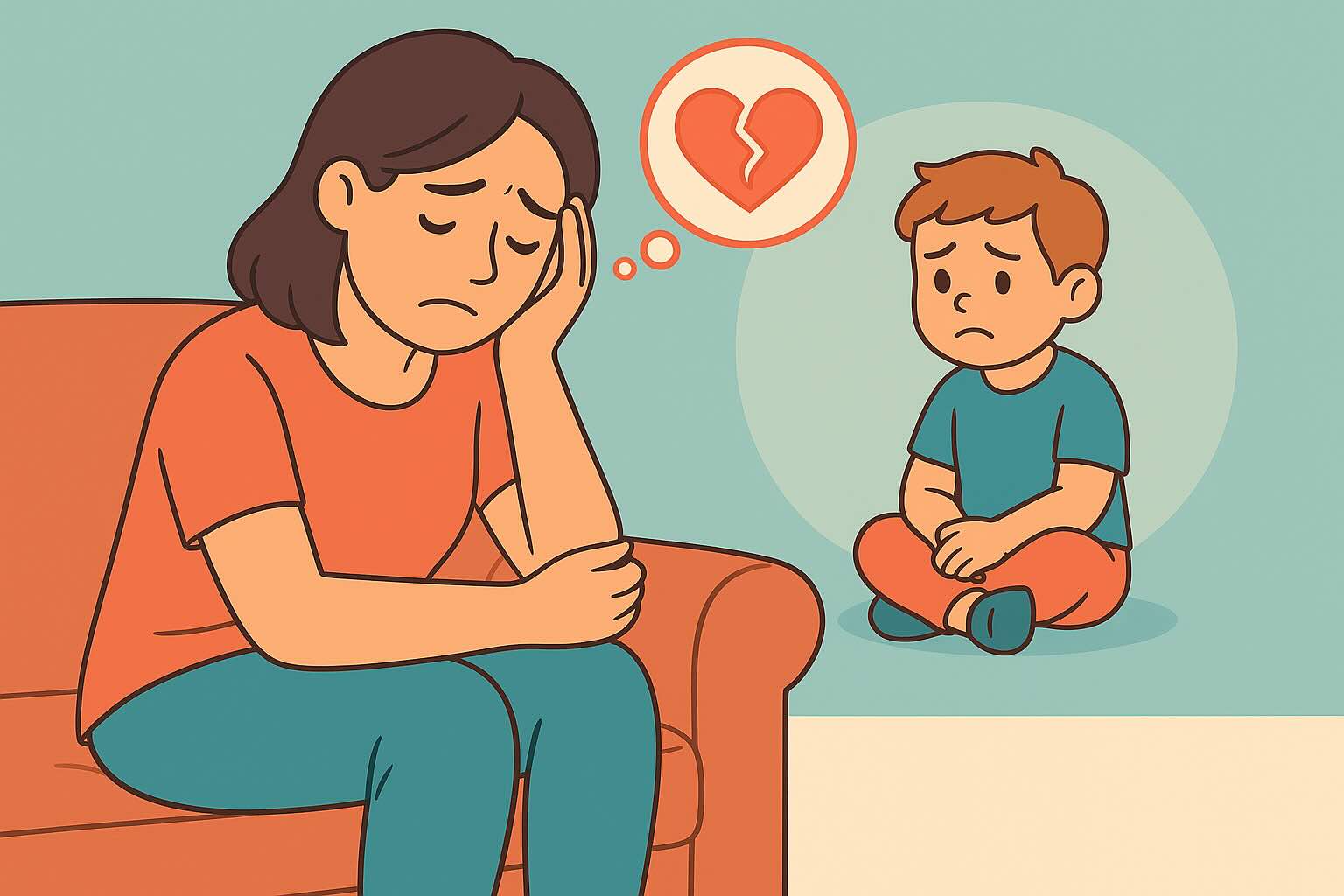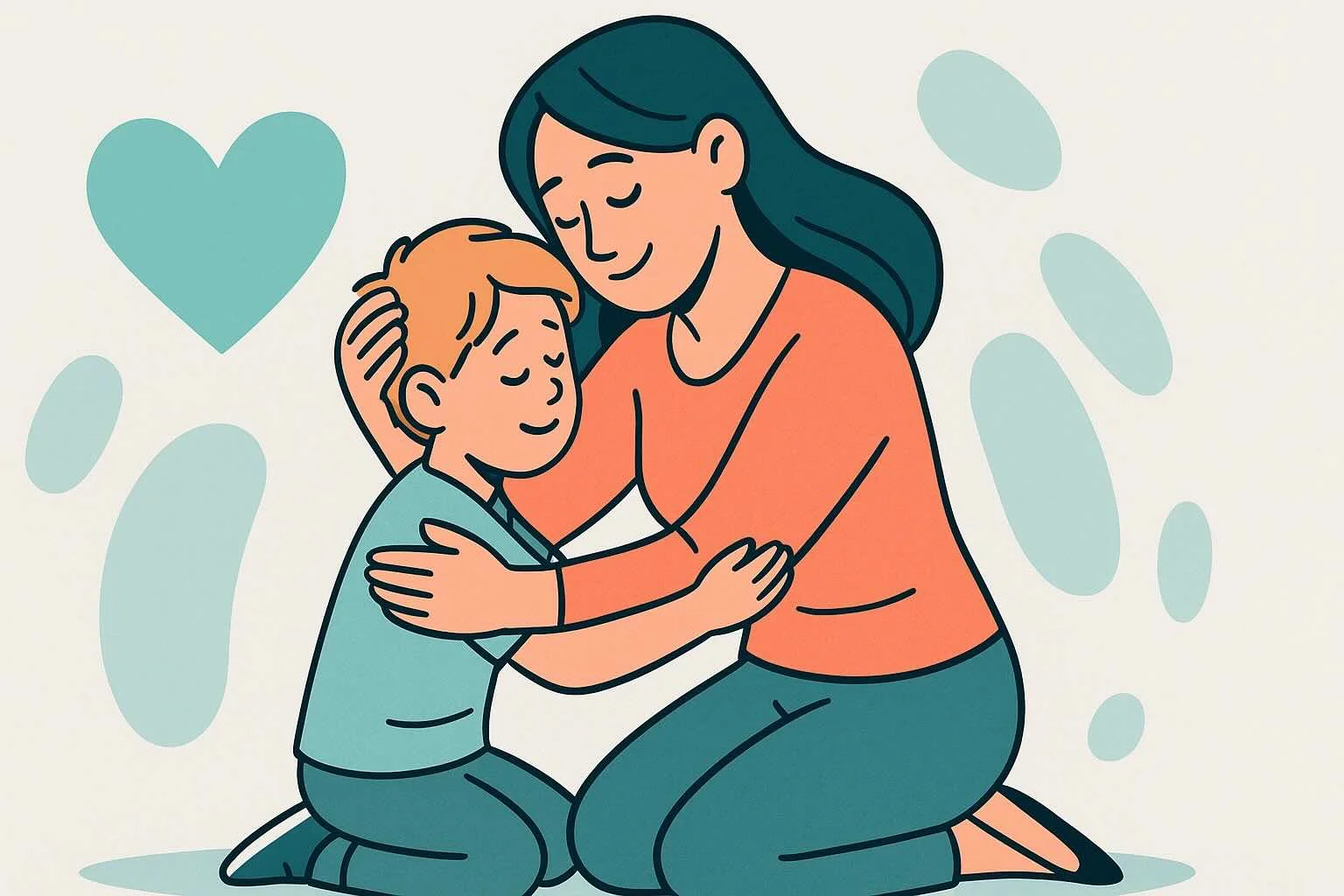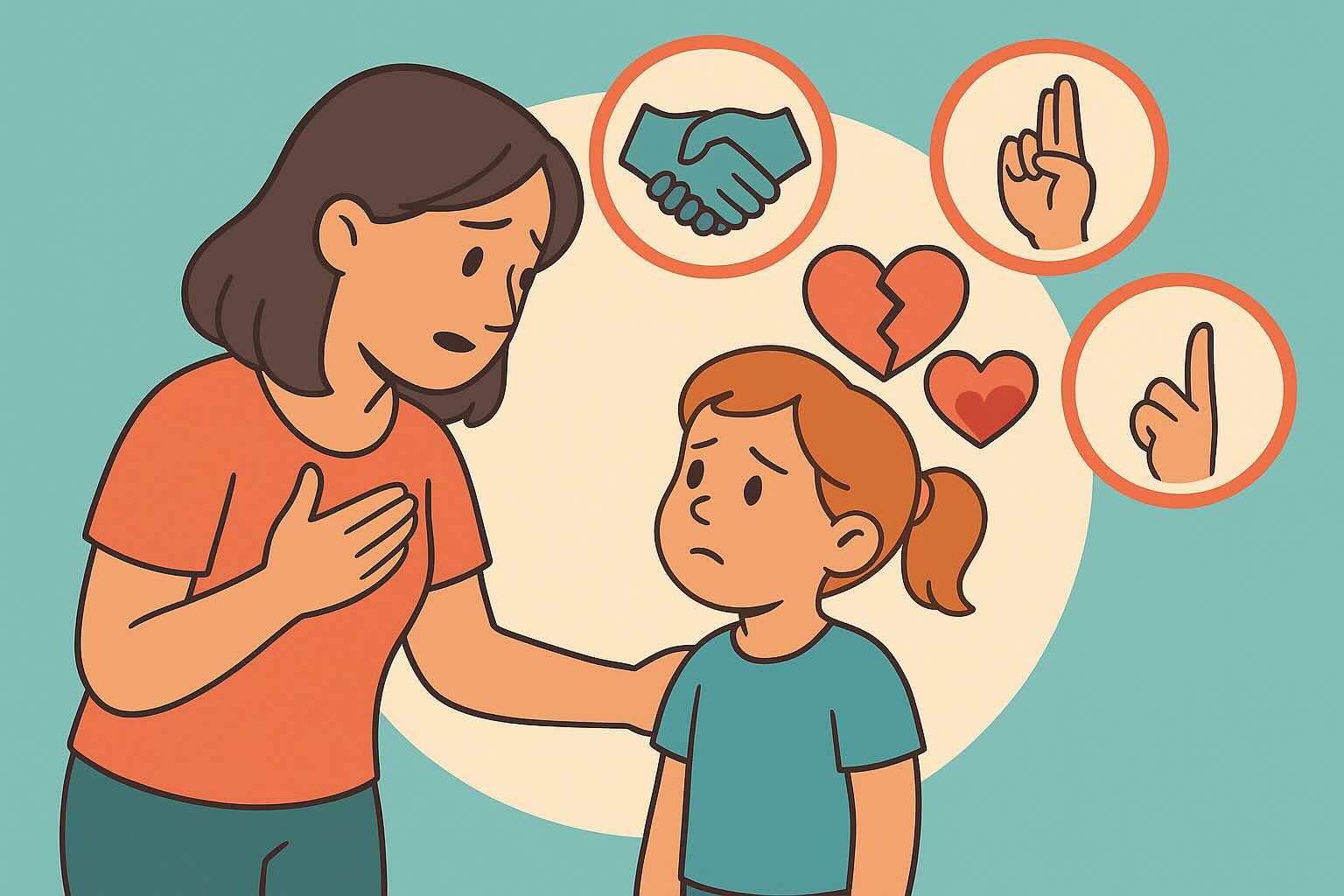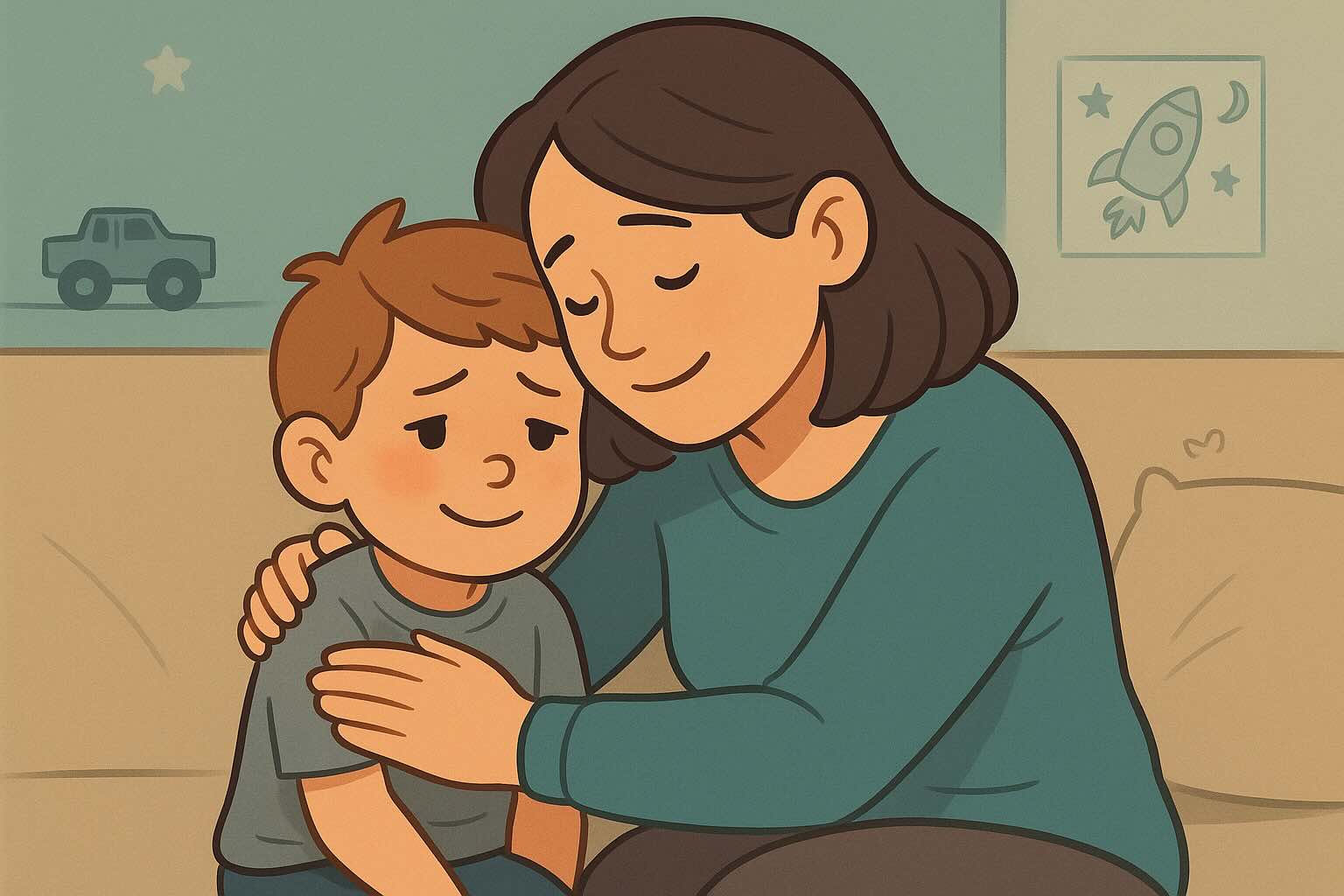Overcoming Parent Guilt: 6 Steps That Transform Shame Into Growth


If you're sitting with that heavy, sick feeling in your stomach after a parenting moment you wish you could take back, you're not alone in this pain. Research shows that 95% of parents report experiencing significant guilt after challenging parenting moments, and feeling terrible about your mistakes is actually a sign of how much you care about your child's wellbeing.
The crushing weight of parent guilt can feel unbearable, but it doesn't have to stay that way. This guide will help you transform that guilt from a paralyzing force into fuel for growth, healing, and becoming the parent you truly want to be.
For related recovery challenges, also check out our guides on rebuilding trust after broken promises and reconnecting after big fights. You may also find our guides on repairing after losing your cool and recovering from harsh parenting helpful.
What You'll Learn in This Guide
- Understanding Parent Guilt - Why it happens and what it's trying to tell you
- Guilt vs. Shame - Crucial differences that affect your recovery and growth
- Immediate Guilt Management - What to do in the first 24 hours after a difficult moment
- Self-Forgiveness Process - Step-by-step strategies for healing and moving forward
- Learning and Growth - How to extract wisdom from your mistakes without self-attack
- Preventing Guilt Spirals - Tools to break cycles of self-criticism and shame
- Building Guilt Resilience - Long-term strategies for healthy self-compassion and growth
Estimated reading time: 12 minutes
Understanding Parent Guilt: What It Really Means
Why Parent Guilt Feels So Intense
Parent guilt hits harder than other types of guilt because:
- Your child's wellbeing feels completely dependent on you
- Society places enormous pressure on parents to be perfect
- You love your child deeply and any harm feels devastating
- Young children seem so vulnerable and innocent
- Your own childhood experiences may amplify current feelings
- Parenting triggers our deepest fears about being good people
The Purpose of Guilt in Parenting
Guilt serves important functions:
- Moral compass: It signals when your actions don't align with your values
- Motivation for change: It pushes you to repair and do better
- Empathy development: It helps you understand your child's experience
- Relationship protection: It motivates you to preserve connection
- Growth catalyst: It can transform mistakes into learning opportunities
However, guilt becomes problematic when:
- It doesn't lead to constructive action
- It lasts longer than necessary for change
- It shifts into shame and self-attack
- It interferes with effective parenting
- It prevents you from enjoying your child
Common Triggers for Intense Parent Guilt
Moments that commonly trigger crushing guilt:
- Yelling at your child in anger
- Using harsh words or threats you regret
- Being too impatient during challenging moments
- Prioritizing other things over your child's needs
- Feeling annoyed or frustrated with normal child behavior
- Comparing yourself to other parents who seem perfect
- Missing important moments due to work or stress
- Having thoughts about wanting a break from parenting
Guilt vs. Shame: Understanding the Crucial Difference
Healthy Guilt: The Path to Growth
Guilt characteristics:
- "I did something wrong" (focuses on behavior)
- Motivates repair and change
- Leads to action and problem-solving
- Maintains sense of self-worth
- Eventually leads to learning and growth
- Preserves relationships through accountability
Guilt statements:
- "I made a mistake when I yelled at my child"
- "I want to do better next time"
- "I can learn from this situation"
- "My behavior was wrong, but I can change"
Toxic Shame: The Destructive Alternative
Shame characteristics:
- "I am a bad parent" (attacks identity)
- Leads to paralysis and self-attack
- Causes withdrawal and defensive behavior
- Damages sense of self-worth
- Keeps you stuck in negative patterns
- Harms relationships through self-protection
Shame statements:
- "I'm a terrible mother/father"
- "My child would be better off without me"
- "I always ruin everything"
- "I'm just like my own dysfunctional parent"
Transforming Shame into Guilt
When you catch shame-based thinking:
Instead of: "I'm such a bad parent" Try: "I made a parenting mistake that I want to learn from"
Instead of: "I always lose my temper" Try: "I lost my temper in this situation and I'm working on better strategies"
Instead of: "My child deserves better than me" Try: "My child deserves my best efforts, and I'm committed to growing"
Instead of: "I'm damaging my child forever" Try: "This was a difficult moment that I can repair and learn from"
Immediate Guilt Management: The First 24 Hours
Step 1: Acknowledge the Guilt Without Judgment (0-2 hours)
Don't try to push the guilt away immediately. It's giving you important information about your values and desires as a parent.
Helpful self-talk:
- "I'm feeling intense guilt because I care deeply about my child"
- "This pain shows how important good parenting is to me"
- "Guilt is normal after difficult parenting moments"
- "This feeling will guide me toward repair and growth"
Step 2: Focus on Immediate Repair (2-6 hours)
Channel guilt into constructive action:
- Repair with your child using age-appropriate language
- Take responsibility for your behavior without excuse-making
- Ensure your child feels emotionally safe and loved
- Focus on connection rather than trying to feel better about yourself
Step 3: Practice Self-Compassion (6-24 hours)
Treat yourself like you would a dear friend:
- Acknowledge that parenting is incredibly challenging
- Remember that all parents make mistakes
- Recognize that your guilt shows your good intentions
- Remind yourself that mistakes are opportunities for growth
Self-compassion phrases:
- "This is a moment of suffering for me as a parent"
- "Difficult parenting moments are part of the human experience"
- "May I be kind to myself as I learn and grow"
- "I am doing my best with the resources I have right now"
The Complete Self-Forgiveness Process
Phase 1: Full Accountability (Days 1-2)
Take complete responsibility without minimizing or excuse-making.
Accountability statements:
- "I yelled at my child when I was overwhelmed"
- "I used harsh words that were hurtful and inappropriate"
- "I prioritized my convenience over my child's emotional needs"
- "I let my frustration control my behavior"
Avoid these accountability traps:
- "I'm sorry, but you were being difficult" (excuse-making)
- "I wouldn't have yelled if you had listened" (blame-shifting)
- "I was just having a bad day" (minimizing)
- "At least I didn't hit you" (comparing to worse behaviors)
Phase 2: Genuine Repair (Days 1-3)
Repair with your child using age-appropriate approaches:
For ages 3-4: "I used my loud, scary voice with you. That was wrong. You are safe and I love you. I'm going to practice using my gentle voice."
For ages 5-7: "I yelled at you when I was frustrated, and that was wrong. You didn't deserve to be yelled at. I was feeling overwhelmed, and I handled my feelings badly. I'm working on better ways to manage my emotions."
Phase 3: Learning Extraction (Days 3-7)
Extract wisdom from the experience without self-attack.
Learning-focused questions:
- What triggered my reaction in this situation?
- What was I feeling before the incident occurred?
- What skills do I need to develop to handle this differently?
- What environmental factors contributed to this moment?
- What does this teach me about my child's needs or development?
Growth mindset approach:
- "This mistake gives me valuable information about my triggers"
- "I can learn specific skills to handle similar situations better"
- "This experience helps me understand my child's perspective"
- "I'm growing in my ability to regulate my emotions under stress"
Phase 4: Prevention Planning (Days 5-14)
Create specific strategies to prevent similar incidents.
Prevention planning steps:
- Identify your personal warning signs of escalation
- Develop specific pause strategies for high-stress moments
- Address underlying factors (stress, fatigue, overwhelm)
- Learn age-appropriate expectations for your child
- Create environmental supports for challenging situations
- Plan specific responses for common triggers
Phase 5: Self-Forgiveness and Integration (Days 10-21)
Move from guilt into growth and self-compassion.
Self-forgiveness is NOT:
- Pretending the incident didn't matter
- Excusing your behavior
- Forgetting about it completely
- Expecting immediate relief from guilt
Self-forgiveness IS:
- Accepting that you're human and make mistakes
- Committing to growth and change
- Treating yourself with the same compassion you'd show others
- Focusing on future behavior rather than past failures
- Integrating the learning into your parenting approach
Specific Guilt Management for Common Scenarios
After Losing Your Temper and Yelling
Guilt thoughts: "I'm just like my own angry parent. I'm damaging my child."
Reframe: "I lost emotional control in a challenging moment. This shows me I need better emotional regulation skills. I can learn from this and model repair for my child."
Action steps:
- Repair immediately with your child
- Identify your specific triggers for this incident
- Learn stress management and emotional regulation techniques
- Create a plan for future overwhelming moments
- Practice self-compassion for being human and imperfect
After Being Too Harsh or Critical
Guilt thoughts: "I'm crushing my child's spirit. They'll remember this forever."
Reframe: "I was too harsh because I was frustrated, and I can acknowledge this mistake and change my approach. Children are resilient when parents take responsibility and repair."
Action steps:
- Apologize specifically for the harshness
- Validate your child's feelings about the experience
- Learn about age-appropriate expectations and communication
- Practice gentler ways to address behavior
- Work on your own perfectionism and frustration tolerance
After Prioritizing Other Things Over Your Child
Guilt thoughts: "I'm a selfish parent. My child feels unimportant to me."
Reframe: "I made a choice that didn't reflect my values about prioritizing my child. I can learn from this and make different choices going forward."
Action steps:
- Acknowledge to your child that they felt unimportant
- Examine your priorities and time management
- Create specific boundaries to protect family time
- Practice saying no to commitments that interfere with parenting
- Plan special one-on-one time to rebuild connection
After Having Negative Thoughts About Your Child
Guilt thoughts: "What kind of parent thinks these things? I must not really love my child."
Reframe: "Having negative thoughts during overwhelming moments is normal and doesn't reflect my true feelings. I love my child and I'm learning to manage stress better."
Action steps:
- Understand that intrusive thoughts don't define you
- Address underlying stress, fatigue, or mental health needs
- Seek support from other parents or professionals
- Focus on your actions rather than temporary thoughts
- Practice stress management and self-care strategies
Breaking Guilt Spirals and Rumination
Recognizing Guilt Spirals
Signs you're in a guilt spiral:
- Constantly replaying the incident in your mind
- Imagining worst-case scenarios about your child's future
- Comparing yourself to "perfect" parents constantly
- Feeling paralyzed about making any parenting decisions
- Having thoughts like "I always" or "I never"
- Physical symptoms like nausea, headaches, or insomnia
Techniques to Break Guilt Spirals
1. The 5-4-3-2-1 Grounding Technique:
- 5 things you can see
- 4 things you can touch
- 3 things you can hear
- 2 things you can smell
- 1 thing you can taste
2. Guilt Thought Challenging:
- "Is this thought helpful or harmful right now?"
- "What would I tell a friend in this situation?"
- "What evidence do I have that contradicts this guilty thought?"
- "How will dwelling on this help me be a better parent?"
3. Action-Oriented Redirection:
- "What one thing can I do right now to move forward?"
- "How can I use this energy for positive change?"
- "What would my child need from me right now?"
- "What's the next right step in this situation?"
4. Time-Limiting Guilt Processing:
- Set aside 15 minutes daily for guilt processing
- Outside that time, redirect to action or self-care
- Use a timer to contain rumination
- Write thoughts down to get them out of your head
Building Long-Term Guilt Resilience
Developing Healthy Self-Compassion
Self-compassion practices:
- Self-kindness: Treat yourself with the same kindness you'd show a good friend
- Common humanity: Remember that all parents struggle and make mistakes
- Mindfulness: Observe guilty thoughts without being overwhelmed by them
Daily self-compassion exercises:
- Morning intention setting: "I will be kind to myself today as I learn"
- Evening reflection: "What did I learn today? How did I grow?"
- Guilt check-ins: "Is this guilt serving me or keeping me stuck?"
- Self-forgiveness practice: "I am human, I am learning, I am enough"
Creating Realistic Parenting Expectations
Replace perfectionist thinking:
Instead of: "Good parents never lose their temper" Reality: "All parents lose their temper sometimes; good parents repair and learn"
Instead of: "I should always be patient and understanding" Reality: "I'm human with limits; I can grow my patience while accepting my humanity"
Instead of: "My child should always be happy with my parenting" Reality: "Sometimes I need to disappoint my child for their wellbeing, and that's okay"
Instead of: "I should instinctively know what my child needs" Reality: "Parenting is learned through experience, mistakes, and growth"
Building Your Support Network
Essential support connections:
- Partner/co-parent: Share guilt and growth honestly
- Parent friends: Connect with others who understand the struggles
- Family: Ask for practical and emotional support
- Professional support: Therapist, parent coach, or support groups
- Online communities: Carefully chosen groups focused on growth, not perfection
Support network guidelines:
- Avoid comparison-heavy environments
- Seek people who normalize parenting struggles
- Find those committed to growth rather than judgment
- Share vulnerabilities with trusted, non-judgmental people
- Offer support to others to build mutual connection
Your 4-Week Guilt Recovery Plan
Week 1: Immediate Repair and Stabilization
- Complete repair process with your child
- Practice basic self-compassion techniques
- Limit guilty rumination to 15 minutes daily
- Focus on emotional regulation and stability
Week 2: Learning and Understanding
- Extract specific learning from the difficult moment
- Identify triggers and patterns
- Begin developing prevention strategies
- Challenge shame-based thinking patterns
Week 3: Skill Building and Growth
- Learn new parenting and emotional regulation skills
- Practice self-compassion daily
- Create specific prevention plans for common triggers
- Build support connections with other parents
Week 4: Integration and Moving Forward
- Integrate new skills into daily parenting
- Establish long-term self-compassion practices
- Create systems for ongoing growth and learning
- Focus on present and future rather than past mistakes
When Guilt Becomes Concerning
Signs You May Need Professional Support
Consider professional help if:
- Guilt persists for weeks without improvement
- You're having thoughts of self-harm or escape
- Guilt is interfering with daily functioning
- You're avoiding your child due to guilt
- You're overcompensating in ways that affect family dynamics
- You have symptoms of depression or anxiety
- Past trauma is being triggered by current parenting challenges
Types of Professional Support
Individual therapy can help with emotional regulation, trauma processing, and self-compassion Parent coaching provides specific parenting skills and strategies Support groups offer connection with other parents facing similar challenges Family therapy can improve family dynamics and communication patterns
Teaching Your Child About Mistakes and Growth
Age-Appropriate Lessons About Human Imperfection
For ages 3-4:
- "Everyone makes mistakes, even grown-ups"
- "When we make mistakes, we say sorry and try to do better"
- "Mistakes help us learn"
- "I love you even when you make mistakes, and you love me even when I make mistakes"
For ages 5-7:
- "Making mistakes is how people learn and grow"
- "The important thing is taking responsibility and making things right"
- "Even parents are still learning how to be the best they can be"
- "What matters most is how we handle our mistakes, not that we're perfect"
Modeling Healthy Guilt Processing
Show your child:
- How to take responsibility without excuse-making
- How to repair relationships after mistakes
- How to learn from difficult experiences
- How to treat yourself with compassion while growing
- How to move forward constructively rather than staying stuck in guilt
Key Takeaways: Your Guilt Recovery Roadmap
- ✅ Guilt shows you care and can motivate positive change when handled healthily
- ✅ Shame is different from guilt and needs to be transformed for healing
- ✅ Self-forgiveness is a process that requires action, not just thinking
- ✅ All parents make mistakes - perfection is neither possible nor necessary
- ✅ Repair strengthens relationships when done genuinely and consistently
- ✅ Self-compassion is learnable and essential for sustainable parenting
- ✅ Professional support is available when guilt becomes overwhelming
- ✅ Growth mindset transforms mistakes into learning opportunities
- ✅ Your children need you to be human, not perfect
Remember: The goal isn't to never feel guilty about parenting mistakes, but to use that guilt as fuel for growth, repair, and becoming the parent your child needs you to be.
This article is based on research in self-compassion, attachment theory, and cognitive-behavioral approaches to guilt and shame. Individual experiences with guilt vary greatly, and persistent or overwhelming guilt may benefit from professional support. Always prioritize your mental health and your child's emotional safety.
Self-Care for Parents
Daily affirmations, guided meditations, and journaling tools to help you stay centered and emotionally balanced.

Parent Repair Scripts
Word-for-word scripts for rebuilding trust and modeling accountability after losing your cool with your child.
Frequently Asked Questions
Need personalized support?
RootWise's AI coach can provide tailored strategies for your specific situation, available 24/7 when you need it most.
Learn More About AI Coaching →



